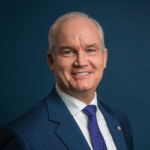Moderator:
Bruce LourieChair, Board of Directors and External Advisory Council
Speakers:
Bentley AllanVice President, Future Economy
Erin O’ToolePresident and Managing Director, ADIT North America; former leader of the Conservative Party of Canada
Related
Readings
- 1:00 - 2:00 pm ET
Canada’s Trade Reset: Building the New Economy
Webinar Summary
Instead of simply reducing its trade dependence on the U.S., what if Canada took a truly strategic approach to seizing global opportunities in clean energy and value-added exports? On the heels of a new Liberal government mandate, Bentley Allan, Transition Pathway Principal at the Transition Accelerator, and Erin O’Toole, former leader of the Conservative Party of Canada, explored how the challenging trade landscape facing Canada could become a catalyst for productivity and growth.
For Allan, the solution starts with understanding Canada’s export edge. Lithium ion batteries and electrical grid equipment were cited as prime strengths, and “an area where we can rapidly grow Canada’s exports, while also advancing” national and global climate change objectives. Both products lie at the convergence of Canada’s export strengths and rising global demand.
Allan also pointed to Prime Minister Carney’s recent mandate letter, where productivity was a core theme. “We can achieve productivity gains, make strategic investments in natural resources, and diversify trade—all at the same time. We can do this by forging backward and forward linkages in Canadian value chains,” explained Allan, citing the need to connect Canadian-mined critical minerals into auto supply chains as a key example.
Meanwhile, O’Toole reinforced the urgency of broadening Canada’s trade horizons. “We need to make sure that even if we move past tariffs, we don’t abandon a trade diversification strategy going forward,” he said. Canada, he warned, cannot afford to revert to the comfort of U.S. markets if global volatility eases. Instead, investors and exporters should be looking at long-term strategies that can build a “margin of excellence” beyond that core market.
Housing featured prominently in the conversation, as panelists noted that modular and prefabricated construction—especially mass timber—offer a chance to ease Canada’s housing shortage while creating new export markets.
Throughout the discussion, both speakers underscored that this is a moment Canada cannot afford to miss. O’Toole cut to the chase: “Since Laurier, we’ve been saying that the next century belongs to Canada—but these slogans need to be more than just words…. The world needs more Canada. We need to get a little more ambition, get our elbows up, and smarten up,”
The conversation offered a blueprint: build resilience through strategic alignment of government and private tools, invest in global trade needs that align with Canada’s export strengths, and ensure Canada has a strategic, integrated trade strategy. It’s a call for Canada to not just weather the volatility of U.S. trade markets, but to lead in shaping a more competitive, resilient economy.
Moderator

Bruce Lourie
Chair, Board of Directors and External Advisory Council
Bruce Lourie is President of the Ivey Foundation and Professor of Practice, Trottier Institute for Sustainability in Engineering and Design, McGill University. He serves on several boards, including the Canadian Institute for Clean Growth and Climate Change, and has held leadership roles with the Independent Electricity System Operator, Ontario Power Authority, and Ontario Trillium Foundation. He is a founding advisor to Canada’s Ecofiscal Commission and has served with the Canadian Energy Research Institute and the University of Oxford’s Social Finance Programme.
A recognized leader in sustainability and public policy, Bruce is known for convening cross-sector collaborations and for his role in Ontario’s coal phase-out—North America’s largest climate action.
Speakers

Bentley Allan, PhD
Vice President, Future Economy
Bentley Allan, PhD, is a Transition Pathway Principal and Vice President, Future Economy at the Transition Accelerator, as well as an Associate Professor of Political Science at Johns Hopkins University. Dr. Allan is an award-winning scholar who has written on the dynamics of international order, science and politics, climate policy, and the political economy of decarbonization. He provides regular advice to government and industry on geopolitics, industrial strategy, and policy.
He has co-lead the development of three sector strategies and roadmaps in collaboration with industry partners. He is the co-coordinator of the Centre for Net-Zero Industrial Policy which advances research and action to strengthen and mobilize Canada’s expertise in modern industrial policy, enabling strategic collaboration between government, industry, indigenous communities, labor, and financial institutions in pursuit of good jobs and a competitive economy.

